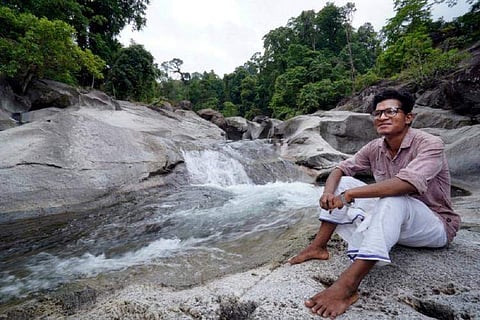

Cholanaikkans are one of the most primitive tribes that live in the forests of Kerala. Native speakers of the Naikka language, an amalgam of Malayalam, Kannada and Tamil, their interaction with the world outside the forest is quite limited. So, when Vinod Mancheery, a 24-year-old, broke all these barriers and moved to Kochi to start pursuing his PhD, the whole world looked upon him with much awe.
A student at the Cochin University of Science and Technology (CUSAT), he is the first from his community to pursue this level of research. "I am researching the socio-economic background of Cholanaikkans and Kattunaikkans (another primitive tribe native to Kerala and Tamil Nadu). Since I belong to one of them, I have an advantage. Not many have researched about us because it is difficult to reach our colonies, which are inside the dense forests," he says, hopeful that he will be able to give back to his community.
While Vinod completed his schooling in various residential schools in Kerala, while residing in Tribal hostels, he pursued his BA in Economics from Sree Vivekananda Padanakendram in Nilambur in Malappuram. He later pursued his MA and MPhil from CUSAT. "While pursuing my bachelor's, I stayed with a faculty. He was quite kind and treated me like his own family member. These years helped me learn Malayalam and speak the language well," he says. Vinod also understands English. "Over the years, many from the Kattunaikkan community moved to towns and cities and this made their language much refined. However, people from our tribe are still dependent on the forest for their livelihood," he says.
Vinod has seven siblings. While he was the first to receive formal education in his family two of his younger siblings are now in school. His wife is pursuing a course from an ITI. "My mother says that she has studied until Grade II. My parents collect honey and other resources from the forest. People were always surprised to know that my father, despite being uneducated, decided to educate me," he says.
As a school student, Vinod went home quite often. Noticing a contrast between the mainland and the forest, he always dreamed of being a forest officer. "But it was only after I finished my Class XII, where I studied humanities, that I realised that I should have studied science. There was no one to mentor me. That was quite disappointing," he recalls. "The next aim was to prepare for the Civil Service Examination. But I had a lot of familial and financial responsibilities and I knew that I couldn't do it being in my position. That was when I thought that I must do something for the tribals and decided to pursue research. By the way, it wasn't a smooth path at all," he says.
Previously, talking to The New Indian Express, Vinod said that until five years ago, the school drop out rate among the Cholanaikkans was quite high, until five years ago. "But things are changing now. However, much needs to be done. The education system is yet not adaptable to the tribal way of living or traditions. Till Class X, tribal students manage as they study in schools where they are in the majority. But after Class X, it’s tough for them to stick to education,” he says.
